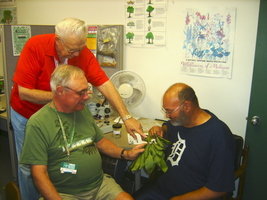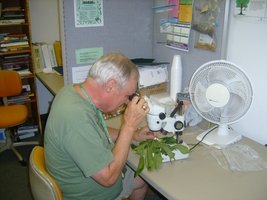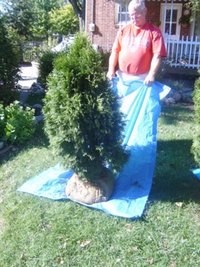





Farmers and Gardeners across this great country owe a debt of gratitude to the late congressman Justin Morrill, of Vermont.
Editor's Note: This article was originally published on August 16, 2007)
In 1862 congressman Morrill introduced a bill which allotted each state in the union 30,000 acres of land for each member of its congressional delegation. The land was to be sold and the proceeds to be used to establish colleges to teach agriculture, military science, and engineering. The bill was passed by congress and signed into law by President Abraham Lincoln.
As a result of the Morrill Act great universities such as Michigan State, Cornell, Texas A&M and Purdue were born.
An outreach program was needed to extend the knowledge gleaned on the campus of these colleges of Agriculture and share it with the public. In 1914 the Smith Lever act was passed by congress and the Cooperative Extension Services was founded.
Today most of the Extension Services fall under the auspices of the land grant university in each state. Every county in all 50 states has a Cooperative Extension office that is a branch of the university.
The extension offers valuable advice to farmers. One of the most important is the soil test. They provide information of the chemical and mineral make up of the soil and recommendations on what type of fertilizer to use for a particular crop. They also monitor insect cycles and deliver information on what pests are active and what controls will be needed.
Here in Michigan, Michigan State sends out weekly reports via email called CAT (crop advisory team alert). They are broken down in to categories such as landscape, fruit, and vegetables. They provide invaluable current information on crops.
Here’s a link to take a look at one. http://www.ipm.msu.edu/cat07veg/v07-18-07.htm
In addition to helping the commercial farmers extension has a great deal of programs to help the home gardener.
One of the most popular is the Master Gardener Program. This is a 2 part educational system.In part 1 avid gardeners are provided many hours of intensive horticulture training. In part 2 the volunteers “pay back” the extension service by providing lectures, school and community gardening, garden hotlines and diagnostic clinics.
The telephone hotline gives gardeners and homeowners an opportunity to call in and speak to a Master Gardener regarding plant or insect questions. The MG will attempt to diagnose the problem and provide a solution to the caller.
The diagnostic clinics are set up where home owners bring in plant or insect samples. The Master Gardener on duty will ascertain the root of the problem and suggest solutions.


Master Gardeners Examine a diseased plant brought
into the diagnostic clinic by a home gardener
I’ve been a Master Gardener since 1997 and can attest that it’s one of the most rewarding things that I’ve ever done. Master Gardeners are a great bunch of folks who have a lot to give and ask nothing in return.
4-H is another program administered by extension. It’s no longer just for “country” kids. It’s fast becoming popular in many urban areas as well. Gardening, animal husbandry, homemaking, art and many other programs are offered to our young people.
Something that I feel is a dying art is also promoted by the extension service. Home Canning and Food Preservation. Many counties offer this program either live or via correspondence course. I took the classes back in the 1970’s and still find it most helpful when preserving the bounty of the harvest. I really feel that our younger generation is loosing out on skills such as these.
Another service provided by extension service is the distribution of bulletins. These booklets provide information on everything from apples to zinnias. Plants, animals, insects are just a few categories available. In addition to booklets, many bulletins are available on CD or DVD’s. These are especially helpful when looking for hands on information such as pruning or other similar activities. Many of the bulletins can be downloaded at no charge. The remainders are available at a very nominal cost via mail.
Services such as infant &child care classes, food and nutrition, and other family related programs are available to you.
As you can see, your Cooperative Extension Service has a program for just about all of us.
In 1862 Congressman Morrill had a vision that is still paying dividends today.
Pauls Garden Tip
Have a heavy load to move around your yard or garden? Place it onto a plastic tarp. It will slide across the ground with ease.
This works well with shrubs, trees and bags of soil or ammendments.

Logo courstey of Michiagan State Universuty Extension Service
Photos by Author
Copyright © www.100flowers.win Botanic Garden All Rights Reserved